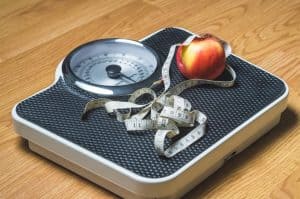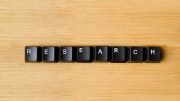Self-monitoring is the best approach to weight loss and it is easy.
Self-monitoring is the centerpiece of most weight loss interventions. It is one of the major and, possibly, most important behavioral interventional strategy for weight management and lifestyle change. Self-monitoring has been used for years by successfully and less successful dieters. It will not guarantee you success, but it will increase the odds that you will lose weight[1] and keep it off.
Self-monitoring is the practice of the observing and recording of weight loss, eating, or exercise as a means to increase weight loss or prevent weight gain. Self-monitoring is one method to improve awareness or mindfulness of behaviors and situations that might lead to weight gain or hinder loss. Consider it a sort of an early warning system that will notify you of potential causes of weight gain before you have added that extra 10-20 pounds.
I have written two articles on self-monitoring and weight loss. This year I wrote a review of research on self-monitoring and weight loss in “Research: Weight Loss Maintenance is key to success.“. This article clearly shows that monitoring will help you keep the weight loss. There are also studies that show that tracking your weight with a scale and measuring your waist circumference will help you lose weight. These are just methods of self-monitoring your weight.
Examples of self-monitoring:
- Abdominal circumference: I find this to be the most accurate way for me to measure fat loss. As my pants fit better, I can feel my confidence rise and my energy go up. Your waistline is an exceptionally accurate way to measure fat loss. It is better than the numbers on your scale[2].
- Exercise and food logs: These journals help you keep track of your successes and failures and helps you keep track of foods that you are unable to limit and exercises that lead to days off. Dietary modification is essential for weight loss and maintenance[3]. They allow you to track calories eaten and expended. Most are very surprised by their net caloric intake. I personally prefer online sites such as loseit.com. Also, www.myfitnesspal.com and www.fitday.com are excellent choices
- Self-weighing: Weighing yourself is the old stand by that has been both widely accepted for years and much maligned. It is a very simple self-monitoring behavior, and most homes have a scale inside them. I use it as a way to track my eating and physical activity indirectly through body weight. Continued regular monitoring of your weight is also essential to help you maintain your weight after initial weight loss[4].
- Exercise trackers: Pedometers such as a Fitbit or the low tech ones of time age track your steps and can help monitor the calories burned. These are self-monitoring tools that if implemented correctly can vastly improve your health and weight loss plans. These devices are becoming more and more popular and accurate. They are one of the simplest of these self-monitoring tools to add to your routine and adding on can be as simple as replacing your old Timex[5].
Does self-monitoring work?
Yes. A recent scientific review looked at prior research for evidence[6]. The review centered on the three components of self-monitoring of weight loss to include diet, exercise, and self-weighing. This review included research published between 1993 and 2009 that reported on the relationship between weight loss and these self-monitoring strategies. Of the 22 studies included, 15 focused on dietary self-monitoring, one on self-monitoring exercise, and six on self-weighing. Researchers found that there was a significant association between self-monitoring and weight loss. This study is in line with the results of prior studies.
Also, it does not take much time. Self-monitoring, unfortunately, has been one of the least popular techniques for those in weight management programs. Self-monitoring is critical for success with lifestyle change. The good news is that it will not take much of your time. A study from March of 2019 showed that a small investment of fewer than 15 minutes per day could make a huge impact[7]. This time investment is very little of your day.
The bottom line: Dietary self-monitoring is one of the best predictors of weight-loss success. It is not easy to adopt, but the challenge will be well worth the effort. The frequency of monitoring, not the time spent on the process, was the key factor for successful weight loss. Self-monitoring techniques are changing and improving with technology, so I am certain you will find one to meet your lifestyle. The key is to ensure self-monitoring translates into lifelong healthier habits.









Be the first to comment on "Research: Is effective weight-loss strategy too difficult?"